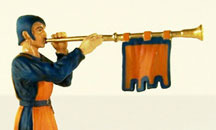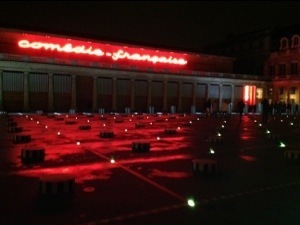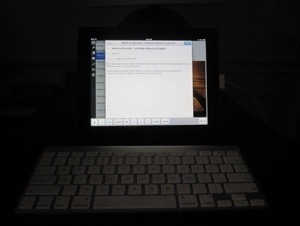Sandra Gulland's Blog, page 24
November 30, 2012
My NEWS: a Josephine B. television mini-series!
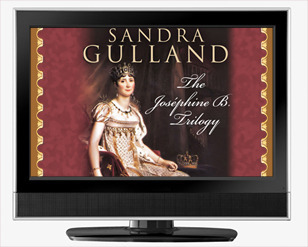
For those of you not on my newsletter emailing: here it is: http://bit.ly/11keASw
The response has been amazing: I answered over 70 congratulatory emails yesterday. There are more today (plus Tweets, plus Facebook comments).
But before I return to my inbox, I want to post the first email I opened this morning:
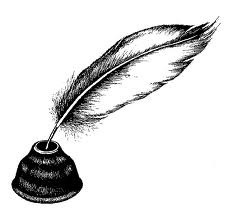
A friend, knowing my love for your books and consequently, Josephine, sent me this [newsletter news] via Facebook.
Almost a decade ago, I read your trilogy which excited a passion for Josephine and anything related. Read every book I could find on Napoleon, his family, the French Revolution, etc. a year later the Josephine exhibit came to my state, Louisiana. I drove to Baton Rouge from my city, Shreveport, several times and met mutually interested friends to be so close to this history.
Two years ago, my husband sent me and a friend on a long-standing dream to celebrate my 40th birthday in Paris. On my birthday, we visited Malmaison. Our private tour guide, Isabella, was precious and as she would begin to elaborate on any history, I would finish her sentences. She finally stated I could be the tour guide!
Interestingly, I just received a gift from a friend, a book about Josephine. And then this news arrived today of your mini-series! Yay! Look forward to following this journey with you!
I love it when readers are sparked to go deeper into the research, and I especially love it when they make the journey to lovely Malmaison!
Now: back to the inbox, and—hopefully—at some point today, back to the final revision of In the Service of the Shadow Queen. Good news can be so diverting!
November 27, 2012
November 16, 2012
The New Yorker: a six-course meal

In addition to finishing The Unlikely pilgrimage of Harold Fry by Rachel Joyce—a wonderful novel—I finally worked my way through the Oct. 15 issue of The New Yorker. I have quite a bit to say about Harold, but the NYer must come first: my husband has been waiting for the hand-over.
This was an exceptionally writerly issue. First, a profile of the religious right-wing writer Lynn Vincent, “Lives of the Saints.” Vincent gives a writers’ workshop on “The Sacred ICPID”: an acronym for I couldn’t put it down.
She’s into formulas, and, being a former math major turn novelist, I particularly liked this one: (B+C-I-P)n, which translates: (Butt + Chair – Internet – Phone) times the number of words you can write without breaking a sweat. Her magic number is 350, the number of words she aims to write twice a day. There’s something about that concept that appeals to me. It’s not nearly as intimidating as 1000 words in one go, which is what I aim for when I’m cooking.
And then there was a lengthy profile of the divine Hilary Mantel, “The Dead are Real.” This article, by Larissa MacFarquhar, had quite a bit to say about historical fiction.
“Historical fiction is a hybrid form, halfway between fiction and nonfiction. It is pioneer country, without fixed laws.”
“It has difficulty distinguishing itself from its easy sister the historical romance. It is thought to involve irritating ways of talking, or excessive descriptions of clothes.”
One of the wonderful things about Mantel winning two Bookers—the first for Wolf Hall, and the second for Bring up the Bodies—is that it plants the Historical Fiction flag firmly in the land of Literary.
I am full of admiration for Hilary Mantel’s work. Having read both novels, I’m tempted to read them again in anticipation of the third and final volume. I have heard that she works in an office lined with corkboard, onto which she pins index cards of scenes. I long to know how she manages the depth and freshness of detail that she does. The wit and the humor!
“I like filing systems. But the whole process of writing novels is the opposite of that—it’s do not label, do not define, do not decide, leave everythign loose. You have to say to yourself, I take my hands off, I let my unconscious work for me. It’s desperately uncomfortable!”
She is a writer with a huge brain. “… I know that books can be got onto the page by craft, but the thing that makes a phrase that fizzes on the paper—you always fear that may not be there any longer, because, after all, you did nothing to deserve it.”
Sigh.
At the end of The New Yorker issue was an article on how women became readers: illuminating. I loved this quote from an account of the reception of the novel Pamela by Richardson:
“The blacksmith of the village had got hold of Richardson’s novel of “Pamela, or Virtue Rewarded,” and used to read it aloud on the long summer evenings, seated on his anvil, and never failed to have a large and attentive audience.”
Is that scene not enchanting?

Real-life update: I’m back in San Miguel de Allende now, and most everything is sorted out. (What goes where, etc.) I’ve been working hard on draft 9.0 of In the Service of the Shadow Queen, which I intend to print out tomorrow.
I’ve started a newsletter, which I hope to get out soon: I have Real News! If you’re not on the newsletter mailing list, sign up here.
On Sunday my husband and I will pack for a trip to California to see my soon-to-be-95-year-old dad and the rest of my family for a wonderful U.S. Thanksgiving. Our son is flying out from New York, and our daughter, her mate, her step-daughter and baby flying down from Toronto. There will be twenty-four at the table, and all my dad’s progeny will be there. Thanksgiving, indeed!
November 11, 2012
Advice from a master: “The price for doing professional work is a good deal higher than you are prepared to pay…”

Late-1938, seeking feedback on her work, aspiring author and university student Frances Turnbull sent her latest story to a friend of her family, F. Scott Fitzgerald.
This is what he wrote back:
November 9, 1938
Dear Frances:
I’ve read the story carefully and, Frances, I’m afraid the price for doing professional work is a good deal higher than you are prepared to pay at present. You’ve got to sell your heart, your strongest reactions, not the little minor things that only touch you lightly, the little experiences that you might tell at dinner. This is especially true when you begin to write, when you have not yet developed the tricks of interesting people on paper, when you have none of the technique which it takes time to learn. When, in short, you have only your emotions to sell.
This is the experience of all writers. It was necessary for Dickens to put into Oliver Twist the child’s passionate resentment at being abused and starved that had haunted his whole childhood. Ernest Hemingway’s first stories “In Our Time” went right down to the bottom of all that he had ever felt and known. In “This Side of Paradise” I wrote about a love affair that was still bleeding as fresh as the skin wound on a haemophile.
The amateur, seeing how the professional having learned all that he’ll ever learn about writing can take a trivial thing such as the most superficial reactions of three uncharacterized girls and make it witty and charming—the amateur thinks he or she can do the same. But the amateur can only realize his ability to transfer his emotions to another person by some such desperate and radical expedient as tearing your first tragic love story out of your heart and putting it on pages for people to see.
That, anyhow, is the price of admission. Whether you are prepared to pay it or, whether it coincides or conflicts with your attitude on what is “nice” is something for you to decide. But literature, even light literature, will accept nothing less from the neophyte. It is one of those professions that wants the “works.” You wouldn’t be interested in a soldier who was only a little brave.
In the light of this, it doesn’t seem worth while to analyze why this story isn’t saleable but I am too fond of you to kid you along about it, as one tends to do at my age. If you ever decide to tell your stories, no one would be more interested than,
Your old friend,
F. Scott Fitzgerald
P.S. I might say that the writing is smooth and agreeable and some of the pages very apt and charming. You have talent—which is the equivalent of a soldier having the right physical qualifications for entering West Point.
My initial response to this letter was positive, but on re-reading I find it a bit snooty (and possibly even slightly prurient). I see no evidence that Frances Turnbull ever went on to publish anything. Too bad.
What are your thoughts?
(Source: F. Scott Fitzgerald: A Life in Letters.) Also, the wonderful blog, Letters of Note.
November 5, 2012
Home again
After over four weeks of travelling with only a carry-on suitcase, we’ve landed in our winter home in lovely San Miguel de Allende, Mexico. (I’m leaving my suitcase out: in exactly two weeks we’ll be going to California for U.S. Thanksgiving with my soon-to-be 95-year-old dad and the rest of my family there.)
Today I’ll tackle getting my office set up so that I can Get To Work. It’s urgent! I’ve “the last revision” to make on The Next Novel for my wonderful editor Melissa Danaczko at Doubleday before it goes into copy and line editing. Deadline: early January, but best before if I can manage it, well knowing how little gets done over the holidays.
And also knowing that I have two Young Adult novels about Josephine’s daughter Hortense to get to work on!
We had a wonderful trip to England, France and Switzerland. One of the highlights was going to Arenenberg, Switzerland, to see Hortense’s last home and the Napoleonic museum there.
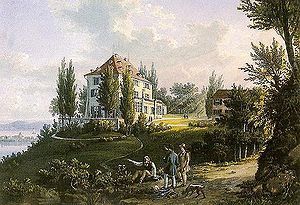
{Arenenberg, Hortense’s last home overlooking beautiful Lake Constance in Switzerland, now a wonderful museum.}
I got an enthusiastic welcome! Everyone had read the Trilogy and loved it. They sell quite a few of the German edition in their gift shop and I signed many, many copies for them.

The museum was astonishing. I got a wonderful tour from Christina Egli, Deputy to Dominik Gügel, the Director. I will have details to report on my research blog, but for now I’ll just leave you with a photo of the lovely statue of Hortense that’s in the chapel there:


October 19, 2012
The Next Big Thing: What I’m writing now
[Going to a performance of a Molière play in Paris a few nights ago: one of the many great pleasures of researching a novel about 17th century theater.]
“The Next Big Thing” is a “chain-blog” going around writers on the Net. I got tagged by historical novelist Stephanie Cowell, author of CLAUDE AND CAMILLE. You can see her own blog on The Next Big Thing here.
Ten Interview Questions for the Next Big Thing: What I’m working on now
What is your working title of your book?
IN THE SERVICE OF THE SHADOW QUEEN
Where did the idea come from for the book?
In researching MISTRESS OF THE SUN, I became intrigued by the life of Claude des Oeillets. She was the daughter of a theatrical star and confidential maid to the infamous Madame de Montespan, the Sun King’s “power mistress.” As well, she had a daughter by the King and dealings with Madame Voisin, the “witch” who was burned at the stake.
Basically, I was curious. Claude’s worlds were fascinating: the theater, the Court, the underground world of witchcraft. Too, she had an intimate view of Montespan, an endlessly fascinating and complex villainess.
What genre does your book fall under?
Historical fiction. I like to think I write literary historical fiction, but that is for readers to decide.
Which actors would you choose to play your characters in a movie rendition?
I’ve always thought Nicole Kidman would be fantastic as Madame de Montespan. As for the others … impossible for me to say. I so rarely watch movies.
What is the one-sentence synopsis of your book?
This is the hardest question you could ask a novelist; it is also the most important question to know how to answer. Here’s my attempt:
IN THE SERVICE OF THE SHADOW QUEEN is a historical novel set in 17th century France and based on the life of Claude des Oeillets, who leaves the disreputable make-believe world of the theater for a prestigious position at Court—only to discover that life at Court is itself an illusion, and one that disguises a horrifying sin.
Will your book be self-published or represented by an agency?
I have an agent, and the book will be published in the spring of 2014 by HarperCollins in Canada and Doubleday in the U.S.
How long did it take you to write the first draft of your manuscript?
One year. At least. And I’m working on the 8th and final draft.
What other books would you compare this story to within your genre?
Another difficult question! I’ve been told that my work is similar to that of Tracy Chevallier. A lovely thought, if true.
Who or what inspired you to write this book?
Curiosity about the world of 17th century French theater and my on-going fascination with Madame de Montespan.
I like to write about people who come into the Court world — or theater world, or underground world — from outside, who view it as a traveller might. This allows us to see it through their eyes, the curious rituals, the details of daily life, the manners. These are the things most of interest to me.
What else about your book might pique the reader’s interest?
I did quite a bit of research into 17th century theater for this novel. I think readers will find it interesting to learn how theater companies were run, how the audiences behaved, how spectacles were performed, and how actors learned their lines … for starters.
(Imagine a visual break here.)
In turn, I am tagging two gifted novelists and warmly invite you to visit their sites:
Caroline Leavitt, author of PICTURES OF YOU.
Lauren B. Davis, author of the Giller long-listed OUR DAILY BREAD
I’m supposed to tag five authors, in fact, but I’m traveling and it’s difficult. Caroline and Lauren will tag their fare share in turn, I know. If you haven’t read their work, I highly recommend that you do so. Also, be sure to read what their Next Big Thing is. It’s sure to be fantastic!
(Imagine another visual break here: it’s impossible to insert from my iPad!)
Message for tagged authors:
Rules of the Next Big Thing
***Use this format for your post
***Answer the ten questions about your current WIP (work in progress)
***Tag five other writers/bloggers and add their links so we can hop over and meet them.
***Include the link of who tagged you and this explanation for the people you have tagged.
***Be sure to line up your five people in advance.
Ten Interview Questions for the Next Big Thing:
What is your working title of your book?
Where did the idea come from for the book?
What genre does your book fall under?
Which actors would you choose to play your characters in a movie rendition?
What is the one-sentence synopsis of your book?
Will your book be self-published or represented by an agency?
How long did it take you to write the first draft of your manuscript?
What other books would you compare this story to within your genre?
Who or what inspired you to write this book?
What else about your book might pique the reader’s interest?
October 17, 2012
Writer on the road — traveling without a computer
My husband and I are one week into a three-week European trip. We’re each traveling with only a backpack and a carry-on size suitcase: a bit of a challenge.
Traveling without a laptop helps. Instead, I’m using my iPad and wireless keyboard. The combination makes it possible to answer emails and write blogs. Sort of. (In writing this post, I lost one draft, and sent out an unfinished one.)
Apps that have been useful: Kindle (of course), Google, Google Maps, Skype, Dropbox, Evernote, Notebook (by Circus Ponies: I use this software at home). And 1Password. I’ll soon try out Pages and 1AWriter for word processing.
My travel-to-Europe-in-October rule of thumb: always pack silk long underwear!
October 9, 2012
Travel gremlins beware!

It snowed here yesterday, and so it seems only right that we’re heading off for the winter tomorrow.
Even so, it’s so beautiful, it’s always wrenching to leave. It’s said that home is where your books are, and leaving my books is hard.
It’s going to be a long trip. We’re going to London, Paris, Burgundy and Switzerland before returning to Toronto and heading down to Mexico for six months. It’s a complex transition to pack for, a complex trip to plan!
But by tomorrow mid-day, the items on my To Do Lists (note: more than one list) will have been ticked off, and those things not … tant pis!
I believe in Travel Gremlins … don’t you? They’re a playful sort of spirit that will throw a surprise catastrophe in your path just when you’re about to step out the door. A basement flood, a child walking into a hornet’s nest, the cat having kittens—these are the more memorable tricks they’ve played on me in the past. I’m on guard!


Going over one of my lists, I noted an invitation from the owner of The Red Wheelbarrow in Paris to stop in for a visit. She’d posted a lovely review of Mistress of the Sun on her blog. A few quotes:
“Mistress of the Sun was a thoroughly enjoyable read.”
“Rich descriptions aside, what elevates this book from romantic fiction … is the portrait Gulland paints of Petite. As portrayed under Gulland’s skillful hands, Petite is a conflicted person who struggles to do her best according to her convictions. While she loves the King greatly, she is unable to reconcile this love with her religious convictions.”

I’m looking forward to meeting the proprietors of The Red Wheelbarrow on this trip. Anyone who names a bookstore after a poem by William Carlos Williams is “thumbs up” in my mind. From the photo above, it looks like my kind of bookstore.
My travel reading has been selected: The Unlikely Pilgrimage of Harold Fry by Rachel Joyce. Have you read it?
October 4, 2012
Cleaning up: Leonard Cohen’s introduction to the Chinese edition of Beautiful Losers

I both curse and thank the bi-annual move from north to south and south to north. It forces me to clean up.
For years I’ve had the summer 2006 edition of Brick magazine on my desk, page 31 tagged with the post-it: “blog.” About time I got around to it, don’t you think?
My prized acquisition this summer was a Fujitsu ScanSnap S1300 scanner, which scans quickly, and can convert a pdf to a searchable text. (I love this scanner!)
Voilá: from a scan of page 31, Leonard Cohen’s introduction to theChinese edition of Beautiful Losers:
Dear Reader,
Thank you for coming to this book. It is an honour, and a surprise, to have the frenzied thoughts of my youth expressed in Chinese characters. I sincerely appreciate the efforts of the translator and the publishers in bringing this curious work to your attention. I hope you will find it useful or amusing.
When I was young, my friends and I read and admired the old Chinese poets. Our ideas of love and friendship, of wine and distance, of poetry itself, were much affected by those ancient songs. Much later, during the years when I practised as a Zen monk under the guidance of my teacher Kyozan Joshu Roshi, the thrilling sermons of Lin Chi (Rinzai) were studied every day. So you can understand, Dear Reader, how privileged I feel to be able to graze, even for a moment, and with such meagre credentials, on the outskirts of your tradition.
This is a difficult book, even in English, if it is taken too seriously. May I suggest that you skip over the parts you don’t like? Dip into it here and there. Perhaps there will be a passage, or even a page, that resonates with your curiosity. After a while, if you are sufficiently bored or unemployed, you may want to readit from cover to cover. In any case, I thank you for your interest in this odd collection of jazz riffs, pop-art jokes, religious kitsch, and muffled prayer, an interest that indicates, to my thinking, a rather reckless, though very touching, generosity on your part.
Beautiful Losers was written outside, on a table set among the rocks, weeds, and daisies, behind my house on Hydra, an island in the Aegean Sea. I lived there many years ago. It was a blazing hot summer. I never covered my head. What you have in your hands is more of a sunstroke than a book.
Dear Reader, please forgive me if I have wasted your time.
— Leonard Cohen
Don’t you simply love him?
October 1, 2012
Why Amazon/Kindle is leader of the pack

My on-going adventure into e-book publishing has been eye-opening. Although I didn’t do even a fraction of it myself, setting up an account on Amazon/Kindle seemed relatively easy (once I got through the hurdle of the tax-exempt forms required for non-American publishers). Kindle Direct Publishing’s instructions were clear and to-the-point, a class act. And the cost: zero.
Barns & Noble doesn’t deal with non-US publishers at all—so that was a dead-end.
Kobo is a growing force in Europe, but they are suffering growing pains—and it shows. Their contracts were confusing and contradictory. They’ve launched a clean, new interface—but it couldn’t upload my books (too big!), so we had to go the geeky route. (So glad Kris was dealing with it, not me.) Although my books are up, I still can’t see them, much less get at any direct information about my sales. Too, it seems they are weekly changing their system. Go, Kobo! You’re David against Goliath, but you do need to get your act together.
iTunes, known to take For Ever to approve a title, came through surprisingly quickly. There were glitches uploading, but once up, okay, although their sales reporting system leaves a bit to be desired. Plus, the sales are about 1% of what gets sold on Amazon. That said, the titles display most beautifully there.

Because most of my INK titles are sold in the UK, I wanted to be in Waterstones and other UK venues. That has turned into an expensive headache: first to get the titles on Nielsen’s database (I’m still working on that), then to have to pay for a middleman. (This requirement was discovered in a deluge of confusing small print.) OK, I got that far, but I was just now informed that to get a book synopsis and reviews even mentioned on Waterstones’ e-book website (which is hard to find and not that functional), I’d have to pay upwards of $240 plus tax each year. I think not.
Which all brings me back to Kindle Direct Publishing: its user-friendly interface, the remarkable ease of uploading and editing … for free. (Sort of: there is a charge for each downloaded purchased title.) Plus, Kindle accounts for well over 90% of sales: no wonder.
I’ve got my own issues with Amazon, but frankly? My practical advice to someone starting out in e-book self-publishing: stick with Kindle Direct.

For information about Sandra Gulland Ink titles: click here.

